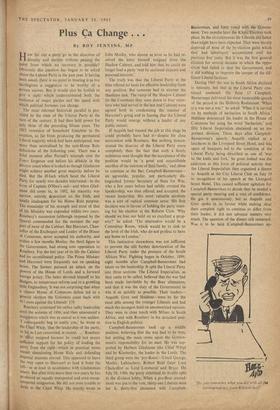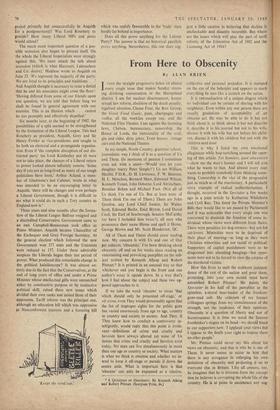Plus Ca Change . . .
By ROY JENKINS, MP
How far can a party go in the direction of disunity and decline without passing the point from which no recovery is possible? Obviously this question has begun to be asked about the Labour Party in the past year. It having been asked, there is no point in treating it as too sacrilegious a suggestion to be worthy of a serious answer. But it would also be foolish to give a reply which underestimated both the resilience of major parties and the speed with which political fortunes can change.
The most relevant historical parallel is pro- vided by the state of the Liberal Party at the turn of the century. It had then held power for only three of the preceding fifteen years. The 1885 extension of household franchise to the counties, so far from producing the permanent Liberal majority which had been anticipated, was more than neutralised by the anti-Home Rule defections of the following year. There was a brief moment after Parnell's triumph over the Times forgeries and before his debacle in the divorce court when it looked as though Gladstone might achieve another great majority before he died. But the ill-luck which beset the Liberal Party for nearly two decades intervened—in the form of Captain O'Shea's suit—and when Glad- stone did come in, in 1892, his majority was narrow, entirely dependent on the Irish, and totally inadequate for his Home Rule purpose. The remainder of his strength and most of that of his Ministry was expended within two years. Rosebery's succession (although imposed by the Queen) commanded for the moment the sup- port of most of the Cabinet. But Harcourt, Chan- cellor of the Exchequer and Leader of the House of Commons, never accepted his authority, and within a few months Morley, the third figure in the Government, had swung into opposition to Rosebery. For the last year of its life the Cabinet had no co-ordinated policy. The Prime Minister and Harcourt were frequently not on speaking terms. The former pursued an attack on the Powers of the House of Lords and a forward foreign policy. The latter devoted himself to his Budgets, to temperance reform and to a growling little Englandism. It was not surprising that when a chance House of Commons defeat led to a general election the Unionists came back with 411 seats against the Liberals' 179.
Rosebery continued his rather sulky leadership until the autumn of 1896, and then announced a resignation which was as casual as it was sudden. I consequently beg to notify you,' he wrote to the Chief Whip, 'that the leadership of the party, so far as I am concerned, is vacant. ...' Rosebery in effect resigned because he could not secure sufficient support for his policy of leading the party from the right—which in practical terms meant abandoning Home Rule and defending Imperial interests abroad. This appeared to leave the way open to Harcourt to lead it from the left—or at least in accordance with Gladstonian tenets. But after little more than two years he too Produced an equally unexpected and even worse- tempered resignation. He did not even trouble to write to the Chief Whip. He merely wrote to John Morley, who almost as soon as he had re- ceived the letter himself resigned from the Shadow Cabinet, and told him that he could no longer lead a party 'rent by sectional disputes and personal interests.'
The truth was that the Liberal Party at the time offered no basis for effective leadership from any position. But someone had to attempt the thankless task. The rump of the Shadow Cabinet (in the Commons they were down to four mem- bers who had served in the last real Cabinet) were agreed both in condemning the manner of Harcourt's going and in fearing that the Liberal Party would emerge without a leader of any public stature.
If Asquith had wanted the job at this stage he could probably have had it—despite his close association with Rosebery. But nothing demon- strated the disarray of the Liberal Party more completely than the fact that such a firmly ambitious man thought that the acceptance of the position would be 'a great and unjustifiable sacrifice of the interests of [his] family,' and chose to continue at the Bar. Campbell-Bannerman- an agreeable, popular, not particularly dis- tinguished former Secretary of State for War, who a few years before had mildly coveted the Speakership, was then offered, and accepted, the vacant leadership. His most valuable attribute was a sort of radical common sense. His first decision was in favour of holding the party meet- ing for his elettion at the Reform Club. 'Why should we lose our hold on so excellent a prop- erty?' he asked. 'The alternative would be a Committee Room, which would be to sink to the level of the Irish, who do not profess to have any home in London.'
This instinctive shrewdness was not sufficient to prevent the still further deterioration of the Liberal Party under the pressure of the South African War. Fighting began in October, 1899, eight months after Campbell-Bannerman had taken on the leadership. It split the Liberal Party into three sections. The Liberal Imperialists, as they came to be called, believed that the war had been made inevitable by the Boer ultimatum, and that it was the duty of the Government to win it as quickly as possible. Their leaders— Asquith, Grey and Haldane—were by far the most able among the younger Liberals and had much the strongest hold on uncommitted opinion. They were in close touch with Milner in South Africa, and with Rosebery in his detached posi- tion in. English politics.
Campbell-Bannerman took up a middle position, believing that the war had to be won, but putting the main stress upon the Govern- ment's responsibility for its start. He was sup- ported by Herbert Gladstone (the Chief Whip) and by Kimberley, the leader in the Lords. The third group were the 'pro-Boers'—Lloyd George, Morley, Labouchere, Robert Reid (later Lord Chancellor as Lord Loreburn) and Bryce. On July 28, 1900, the party exhibited its double split in the division lobby. When a pro-Boer amend- ment was put to the vote, thirty-one Liberals were for it, thirty-five abstained with Campbell- Bannerman, and forty voted with the Govern- ment. Two months later the Khaki Election took place. In the circumstances the Liberals did better than might have been expected. They were merely _deprived of most of the by-election gains which they had laboriously accumulated over the previous five years. But it was the first general election for several decades in which the oppo- sition had failed to dent the Government, and it did nothing to improve the temper of the dif- ferent Liberal factions.
During 1901 the war in South Africa declined in intensity, but that in the Liberal Party con- tinued unabated. On June 17 Campbell- Bannerman delivered his most memorable speech of the period at the Holborn Restaurant. 'When is a war not a war?' he asked. 'When it is carried on by methods of barbarism in South Africa.' Haldane denounced his leader in the House of Commons for using the word 'barbarism,' and fifty Liberal Imperialists abstained on an im portant division. Three days after Campbell- Bannerman's speech, Asquith replied at a luncheon in the Liverpool Street Hotel, and this spate of banquets led to the condition of the Liberal Party being described as one of 'war to the knife and fork.' So great indeed was the addiction to this form of political activity that the Liberal Imperialists then organised a dinner to Asquith at the City Liberal Club on July 19 in ' recognition of his speech at the Liverpool Street Hotel. This caused sufficient agitation for Campbell-Bannerman to decide that he needed a special party meeting and a vote of confidence. He got it unanimously, but as Asquith and Grey spoke in its favour while making clear their complete right to continue to differ from their leader, it did not advance matters very much. The question of the dinner still remained. Was it to be held (Campbell-Bannerman ap- 'Do you remember what von did with all the correspondence from Khrushchev?' pealed privately but unsuccessfully fo Asquith for a postponement)? Was Lord Rosebery to preside? How many Liberal MPs and peers would attend?
The much more important question of a pos- sible secession also began to present itself. On the whole the Liberal Imperialists were strongly against this. `We must smash the talk about secession (which is what Harcourt, Labouchere and Co. desire),' Haldane wrote to Asquith on June 23. 'We represent the majority of the party. We are loyal to its principles and traditions. . . And Asquith thought it necessary to issue a denial that he and his associates might cross the floor : 'Having differed from some of our friends upon one question, we are told that before long we shall be found in general agreement with our enemies. This is an illusion which . . . cannot be too promptly and effectively dispelled.'
Six months later, at the beginning of 1902. the possibilities of a split seemed to be strengthened by the formation of the Liberal League. This had Rosebery as president, Asquith, Grey and Sir Henry Fowler as vice-presidents, and sought to be both an electoral and a propaganda organisa- tion. Even if `the complete disruption of our dis- tracted party' (as Lord Kimberley put it) were not to take place, the chances of a Liberal return to power looked almost infinitely remote. 'Some day if you are as long-lived as many of our tough politicians have been,' Arthur Acland, a mem- ber of Gladstone's last Cabinet, wrote in what was intended to be an encouraging letter to Asquith, 'there will be changes and even perhaps a Liberal Government, though it is difficult to see what it could do in such a Tory country as England now is.'
Three years and nine months after the forma- tion of the Liberal League Balfour resigned and a discredited Conservative Government came to an end. Campbell-Bannerman took office as Prime Minister, Asquith became Chancellor of the Exchequer and Grey Foreign Secretary. At the general election which followed the new Government won 377 seats and the Unionists were reduced to 157. Under these admirable auspices the Liberals began their last period of power. What produced this remarkable change in the political kaleidoscope? It was almost en- tirely due to the fact that the Conservatives, at the end of long years of office and under a Prime Minister whose intellectual gifts were unmatched either by constructive purpose or by instinctive political skill, raised three new issues which divided their own ranks and united those of their opponents. Tariff reform was the principal one, although an education bill which was oppressive to Nonconformist interests and a licensing bill 'Keeps the wind out.' which was unduly favourable to the 'trade' were hardly far behind in importance.
Does all this prove anything for the Labour Party? The answer is that no historical parallels prove anything. Nevertheless, this one does sug- gest a little caution in believing that decline is uncheckable and disunity incurable. But where are the issues which will play the part of tariff reform, of the Education Act of 1902 and the Licensing Act of 1904?



































 Previous page
Previous page